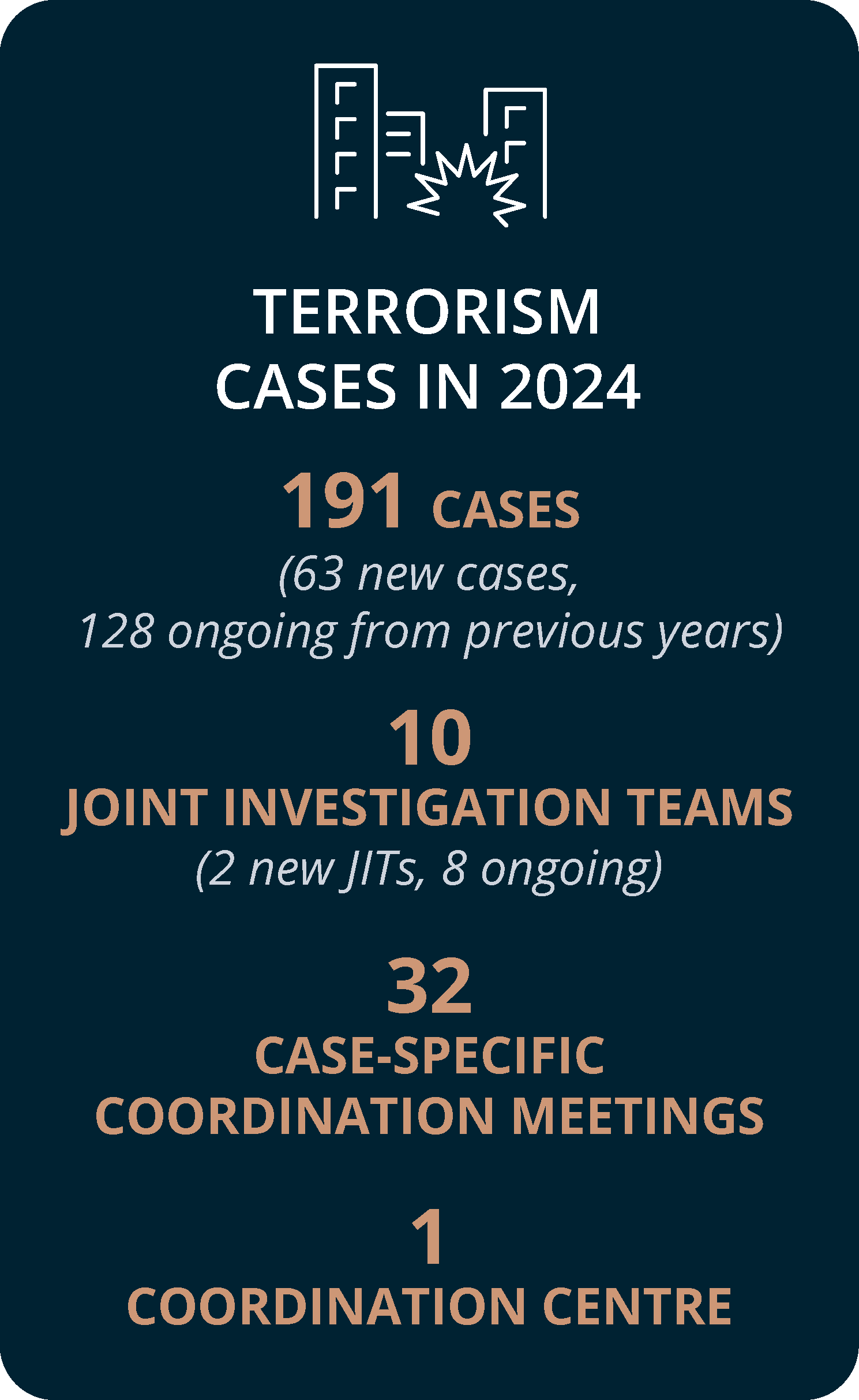Terrorism, in all its forms and manifestations, is a key threat to the security and safety of EU Member States, as well as to democratic values and the rule of law. The nature of terrorist threats has become increasingly diverse in recent years – based on different ideologies, motivations and triggers.
New technologies are often misused by terrorist groups and actors, and the online space has become a breeding ground for radicalisation, propaganda, recruitment, incitement and fundraising. The cross-border nature of terrorist networks and activities calls for enhanced information sharing and coordination to ensure a robust judicial response.
Eurojust’s operational support to terrorism cases

Eurojust’s coordination role in complex, cross-border terrorism investigations and prosecutions grew substantially in 2024. The Agency’s increased role is demonstrated by the higher number of coordination meetings and JITs dedicated to terrorism cases in 2024 compared to the previous year. Moreover, the Agency set up a coordination centre on its premises to support a joint action day, which successfully disrupted terrorist communications and online propaganda (see key case).
Eurojust assisted the national authorities of EU Member States and partner third countries in almost 200 terrorism-related cases in 2024. Italy initiated the most terrorism cases at the Agency in 2024, followed by France, Spain and Germany. The Netherlands, followed by France, was the country most frequently requested to participate in cross-border terrorism cases. The United Kingdom and Norway were the third countries that owned the most terrorism cases at the Agency in 2024, while Ukraine and the United Kingdom were the third countries most frequently requested to participate in terrorism cases.
The cases supported by Eurojust were driven by different ideologies and concerned a range of criminal acts, including the preparation or commission of terrorist acts, participation in a terrorist organisation, terrorism financing, training, recruitment, radicalisation, incitement and public provocation to terrorism. In some cases, terrorist offences were investigated together with other crimes, such as murder, kidnapping, illegal restraint and hostage-taking, and illicit trafficking in arms, ammunition and explosives.
Eurojust’s expert and hands-on support to national judicial authorities included facilitating the execution of European Investigation Orders (EIOs) and Mutual Legal Assistance (MLA) requests to obtain information and evidence, hear witnesses or carry out other investigative measures. The Agency also facilitated European Arrest Warrants (EAWs) and extradition requests, coordinated parallel investigations, assisted in setting up and funding JITs and resolving ne bis in idem issues.
Throughout the year, Eurojust continued to collect information from national authorities on ongoing or concluded criminal investigations, prosecutions, court proceedings or decisions on terrorist offences through the European Judicial Counter-Terrorism Register (CTR). The Register makes it possible to identify links between individuals and networks that are part of ongoing and past investigations throughout the EU.
Strategic developments impacting Eurojust’s counter-terrorism casework
In 2024, the Council of the European Union called for Eurojust and other EU JHA agencies to be more closely involved in intensifying counter-terrorism cooperation with third countries that are key to the EU’s security. The Council also encouraged the adequate exchange of information on terrorism and violent extremism between EU JHA agencies and trusted partners[1].
The conclusion of expert negotiations and the progress towards a pan-European definition of terrorism at the Council of Europe in 2024 is an important step that will have an impact on Mutual Legal Assistance in terrorism cases across Europe, including those supported by Eurojust.

